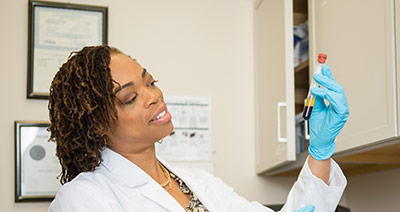Testicular Cancer Self-Screening Reminder

It’s April, which means testicular cancer awareness month is upon us. Testicular cancer is relatively rare yet has the highest prevalence of any cancer in males between the ages of 15 and 44. Unlike many other cancers, testicular cancer self-screening is straightforward and very effective. Regular self-testing has saved lives and, in part because of early detection, has made testicular cancer eminently treatable with exceptional survivorship.
How to Perform a Testicular Cancer Self-Examination
Performing a self-exam is very straightforward and starts by standing in front of the mirror to check for any swelling of the scrotum.
From there, grasp one testicle with both hands, keeping the thumbs at the top of the testicle and the index and middle finger at the bottom of the testicle. Feel around the testicle to ensure it is smooth. You may feel a tube-like structure at the back of the testicle.
This is known as the epididymis and is perfectly normal. You may also feel that one testicle is larger than the other, which is nothing to be concerned about.
If you feel a lump or bump on the otherwise smooth testicle, this is a sign that something is not quite right. This does not necessarily mean that you have testicular cancer, but because 90% of testicular cancers manifest as lumps, you must visit a urologist immediately.
Pain in the testes is another reason to visit your urologist. Remember that testicular cancer does not necessarily present with pain in every case, but chronic or intermittent recurrent pain is not normal.
You should also check the firmness of each testicle. If one seed feels significantly harder, there may be a concern, even without pain or a lump.
Early Treatment and Excellent Survivability
Fortunately, testicular cancer caught early and remaining localized to the testicle has upwards of 99% five-year survivorship. If the cancer has spread, survivorship rates drop to between 90 and 95%, depending on the degree of spread. Typically, when testicular cancer metastasizes, the cancer travels to the lungs and, in the very worst cases, the bones.
With such excellent treatment rates and a simple self-examination for early diagnosis, there’s no reason not to perform a monthly check to ensure your testicles are healthy.
This Testicular Cancer Awareness Month, and every month, we encourage you to stay healthy and be vigilant. This is also an excellent time to speak to your urologist about any family or personal cancer history. If a close family member has had cancer, particularly testicular cancer, or if you have beaten cancer in the past, you are at increased risk of developing testicular cancer. Patients who have received radiation to the lower abdomen or groin should also be in touch with their urologist for a screening protocol. For more information, schedule a consult with Dr. Engel.





